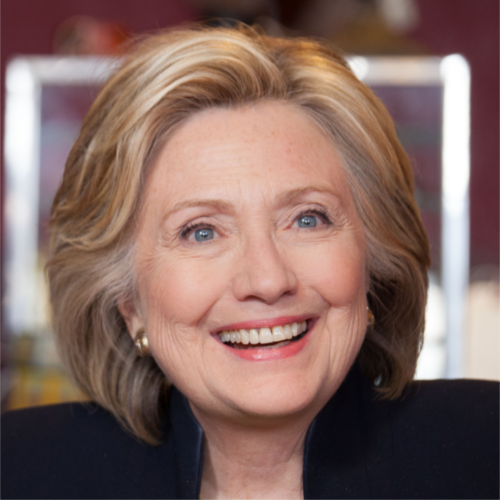
Hillary Diane Rodham Clinton (born October 26, 1947) is an American politician who served as the 67th United States Secretary of State under President Barack Obama from 2009 to 2013. The wife of Bill Clinton, the 42nd President of the United States, she was First Lady of the United States during his tenure from 1993 to 2001. She served as a United States Senator from New York from 2001 to 2009.
An Illinois native, Hillary Rodham graduated from Wellesley College in 1969, where she became the first student commencement speaker, then earned her J.D. from Yale Law School in 1973. After a stint as a Congressional legal counsel, she moved to Arkansas, marrying Bill Clinton in 1975. She co-founded Arkansas Advocates for Children and Families in 1977, became the first female chair of the Legal Services Corporation in 1978, and was named the first female partner at Rose Law Firm in 1979. The National Law Journal twice listed her as one of the hundred most influential lawyers in America. While First Lady of Arkansas from 1979 to 1981 and 1983 to 1992, she led a task force that reformed Arkansas' education system, while sitting on the board of directors of Wal-Mart, among other corporations.
After moving to New York, Clinton was elected in 2000 as the first female senator from the state, the first and so far only First Lady ever to have sought elected office. Following the September 11 attacks, she voted for and supported military action in Afghanistan and the Iraq Resolution, but subsequently objected to the George W. Bush administration's conduct of the Iraq War, as well as most of Bush's domestic policies. Clinton was re-elected to the Senate in 2006. Running for the Democratic nomination in the 2008 presidential election, Clinton won more primaries and delegates than any other female candidate in American history, but ultimately lost the nomination to Obama.
As Secretary of State in the Obama administration from January 2009 to February 2013, Clinton was at the forefront of the U.S. response to the Arab Spring and advocated the U.S. military intervention in Libya. She took responsibility for security lapses related to the 2012 Benghazi attack, which resulted in the deaths of American consulate personnel, but defended her personal actions in regard to the matter. Clinton visited more countries than any other Secretary of State. She viewed "smart power" as the strategy for asserting U.S. leadership and values, by combining military power with diplomacy and American capabilities in economics, technology, and other areas. She encouraged empowerment of women everywhere and used social media to communicate the U.S. message abroad. Leaving office at the end of Obama's first term, she authored her fifth book and undertook speaking engagements before announcing her second run for the Democratic nomination in the 2016 presidential election.

Secretary Clinton has mostly called to build on what President Obama has done in office. She believes in keeping and improving the Affordable Care Act, but does not believe in moving to a Medicare-for-all, single-payer healthcare system. She has advocated for a program for college students in which they can graduate with no debt by working ten hours a week. She generally opposes reducing or changing social programs, and in some cases expanding the safety net programs. She believes in pursuing campaign finance reform, and supports the LGBT movement.

Sec. Clinton generally believes in multi-lateralism in regards to international agreements. She has championed the Iran Nuclear Deal and believes it will prevent Iran from attaining nuclear weapons while welcoming Iran into the international market. She was a key part of the Obama Administration's foreign policy, especially in the four years in which she served as Secretary of State.

Secretary Clinton is considered the most interventionist in the Democratic race. She supported the War in Iraq as a senator, but has since called it a mistake. As Secretary of State, she led the intervention in Libya. She supports building an international coalition to "degrade and defeat" ISIS. She has not called for an increase or decrease in military spending, but has claimed the US needs a modern military.

Sec. Clinton supports a path to citizenship for those in the country illegally, and has strongly denounced Mr. Trump's rhetoric, saying that it is based in xenophobia and nationalism.
See Hillary Clinton's Stance on All The Issues »